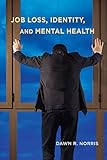Job Loss, Identity, and Mental Health / Dawn R. Norris.
Material type: TextPublisher: New Brunswick, NJ : Rutgers University Press, [2016]Copyright date: ©2016Description: 1 online resource (202 p.) : 1 figure, 2 tablesContent type:
TextPublisher: New Brunswick, NJ : Rutgers University Press, [2016]Copyright date: ©2016Description: 1 online resource (202 p.) : 1 figure, 2 tablesContent type: - 9780813573830
- 9780813573823
- 305.9/06940973 23
- HD5708.2.U6 N67 2016
- online - DeGruyter
- Issued also in print.
| Item type | Current library | Call number | URL | Status | Notes | Barcode | |
|---|---|---|---|---|---|---|---|
 eBook
eBook
|
Biblioteca "Angelicum" Pont. Univ. S.Tommaso d'Aquino Nuvola online | online - DeGruyter (Browse shelf(Opens below)) | Online access | Not for loan (Accesso limitato) | Accesso per gli utenti autorizzati / Access for authorized users | (dgr)9780813573823 |
Frontmatter -- CONTENTS -- ACKNOWLEDGMENTS -- 1. Introduction -- 2. Why Identity? -- 3. "That's Not the Way We Do It at Gentay": Feedback Mismatches -- 4. "I Wasn't the Same Person": Time Mismatches -- 5. "Me Caveman . . . I Club Deer": Status Mismatches -- 6. "On the Mommy Track": Shifting -- 7. "It Was Like I Was Still Working": Sustaining -- 8. "Like You're Dead and Nobody Told You": Identity Void -- 9. Conclusion -- APPENDIX A: METHODOLOGY -- APPENDIX B: ADDITIONAL CONSIDERATIONS -- NOTES -- REFERENCES -- INDEX -- ABOUT THE AUTHOR
restricted access online access with authorization star
http://purl.org/coar/access_right/c_16ec
Our jobs are often a big part of our identities, and when we are fired, we can feel confused, hurt, and powerless-at sea in terms of who we are. Drawing on extensive, real-life interviews, Job Loss, Identity, and Mental Health shines a light on the experiences of unemployed, middle-class professional men and women, showing how job loss can affect both identity and mental health. Sociologist Dawn R. Norris uses in-depth interviews to offer insight into the experience of losing a job-what it means for daily life, how the unemployed feel about it, and the process they go through as they try to deal with job loss and their new identities as unemployed people. Norris highlights several specific challenges to identity that can occur. For instance, the way other people interact with the unemployed either helps them feel sure about who they are, or leads them to question their identities. Another identity threat happens when the unemployed no longer feel they are the same person they used to be. Norris also examines the importance of the subjective meaning people give to statuses, along with the strong influence of society's expectations. For example, men in Norris's study often used the stereotype of the "male breadwinner" to define who they were. Job Loss, Identity, and Mental Health describes various strategies to cope with identity loss, including "shifting" away from a work-related identity and instead emphasizing a nonwork identity (such as "a parent"), or conversely "sustaining" a work-related identity even though he or she is actually unemployed. Finally, Norris explores the social factors-often out of the control of unemployed people-that make these strategies possible or impossible. A compelling portrait of a little-studied aspect of the Great Recession, Job Loss, Identity, and Mental Health is filled with insight into the identity crises that unemployment can trigger, as well as strategies to help the unemployed maintain their mental strength.
Issued also in print.
Mode of access: Internet via World Wide Web.
In English.
Description based on online resource; title from PDF title page (publisher's Web site, viewed 30. Aug 2021)


